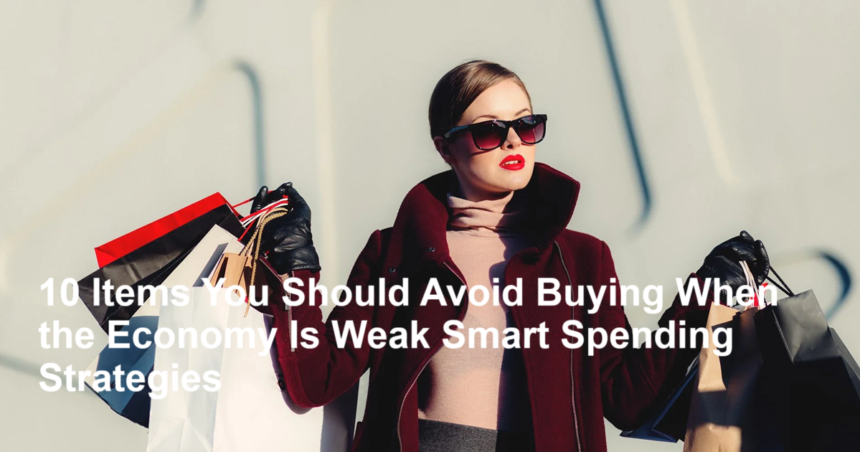When the economy takes a downturn, it is essential to adjust your spending habits to protect your financial health. Economic slowdowns often bring uncertainty, job instability, and reduced income, making it vital to prioritize essential spending and avoid unnecessary purchases. Knowing what items to avoid buying during these times can help you preserve your savings and maintain financial stability.
This article presents 10 key items you should avoid buying during an economic downturn. By steering clear of these purchases, you can better manage your budget and reduce financial stress.
1. Luxury Goods
Luxury items such as designer clothing, high-end accessories, and premium electronics are tempting but often non-essential. Purchasing luxury goods during an economic slowdown can drain your resources quickly, as their prices are high and their value depreciates rapidly. Instead, focus on necessities and postpone luxury spending until the economy stabilizes.
2. Brand-New Cars
Cars are one of the most significant expenses in a household. Buying a brand-new car comes with high upfront costs, insurance, and maintenance expenses. During economic uncertainty, it’s wise to delay purchasing new vehicles. Consider maintaining your current car longer or exploring reliable used vehicles to minimize expenses.
3. Expensive Gadgets and Electronics
Constantly upgrading to the newest smartphone, laptop, or other electronic devices is an expensive habit. When the economy is weak, it’s better to use your current gadgets for a longer period or buy certified refurbished products to save money.
4. Large Home Appliances
Purchasing big ticket home appliances such as refrigerators, washers, and dryers should be avoided unless absolutely necessary. These items often require financing and add to your monthly financial obligations. If your current appliances are still functional, delay replacement until financial conditions improve.
5. Dining Out Frequently
Eating at restaurants or ordering takeaway regularly can quickly add up. During economic slowdowns, making meals at home is a more budget-friendly choice. Reducing dining out not only saves money but also promotes healthier eating habits.
6. Non-Urgent Home Renovations
Home improvement projects can be costly and often non-urgent. Avoid undertaking major renovations or buying new furniture unless it’s essential. Postponing such expenses helps preserve cash reserves during uncertain times.
7. Subscription Services You Don’t Use
Streaming services, gym memberships, and other subscriptions can accumulate without being fully utilized. Review your subscriptions and cancel those you don’t actively use. This helps reduce recurring expenses and improve your monthly cash flow.
8. Expensive Vacations and Travel
Traveling can be invaluable for relaxation but costly, especially during tough economic times. Postpone extravagant vacations and opt for local or budget-friendly alternatives like staycations, which provide a break without significant spending.
9. High-Interest Debt Purchases
Avoid financing large purchases with credit cards or high-interest loans. The cost of borrowing can quickly escalate your debt, negatively affecting your financial stability during recessions.
10. Impulse Buys
Economic stress often triggers emotional spending. Avoid impulsive purchases by planning your shopping carefully and sticking to a budget. Thoughtful spending decisions help you maintain control over your finances.
Why Smart Spending Matters in an Economic Downturn
Limiting spending on these 10 categories helps build financial resilience during times of economic stress. By conserving cash, avoiding high-interest debt, and focusing on essentials, you improve your ability to handle unexpected expenses and safeguard your long-term financial well-being.
Conclusion
When the economy is weak, knowing what not to buy is just as critical as knowing what to save or invest in. Avoiding luxury goods, new vehicles, expensive gadgets, large appliances, dining out, non-urgent renovations, unused subscriptions, costly travel, high-interest debt purchases, and impulse buys can protect your financial stability. By practicing smart spending during downturns, you position yourself for stronger financial health when the economy recovers.












